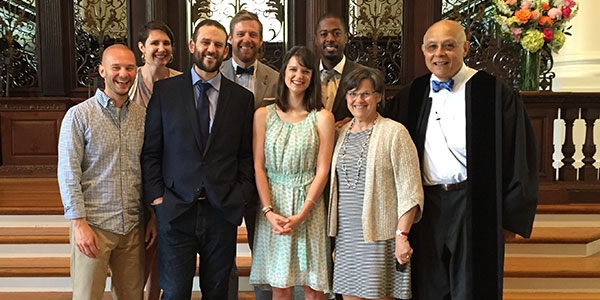By Lucy A. Forster-Smith

Krista Tippett, broadcast journalist and host of NPR’s ON BEING begins her memoir with these reflections, “Our sacred traditions could help us live more thoughtfully, generously, and hopefully with the tension of our age. But to grasp that, we must look anew at the nature of faith, and at what it might really mean to take religion seriously in human life and in the world.” I believe Ms. Tippett names the challenge and opportunity for our work at Harvard in the 21st Century. But how do we address the tension of our age? How do we equip a new generation of religious leaders for such a time as this? Where are the hands, the feet, the heart, and the religious imagination that are called to take up the weighty and wondrous issues of our time?
Two of the most remarkable aspects of the position I hold as Sedgwick Chaplain to the University and Senior Minister in Memorial Church are my work supervising seminarians and my responsibility to be a part of the Harvard Chaplains. By way of reflecting on my first full year in my new role I realize that both of these responsibilities bring deep joy and gratification.
Memorial Church has a long history of supporting seminarians and divinity school students who are exploring a call to ministry. Through the Ministry/Epps Fellows we have benefited from the theologically animated energy of young adults who are at the beginning of their career as newly minted ministers. Along with the Fellows (generally those who are recent graduates of Harvard Divinity School), Memorial Church also is a site for seminarians and divinity school students to engage in Field Education. These student work 12–15 hours a week at Memorial Church in a range of roles from worship leadership to student ministry. Though most of us have contact with the seminarians in their public roles (Sunday worship leadership, Faith & Life host, Morning Prayers reader, Compline and Evensong leader) behind the scenes, in conversations, seminars, meetings and projects, these students spend hours in supervised settings considering their call to work in and out of religious communities, whether they should be ordained (if their tradition allows it), how a random conversation at the door with a student on Sunday was so gratifying that they might think about becoming a university chaplain, how they can best respond to challenges leveled by people who are not in supervisory roles with them. What I love about supervising seminarians is the light that shines out of their grappling spirits! I stand as a witness to God’s call to a new generation of leaders for church and society. A window opens into my own soul by their earnest and pressing questions about the life of faith in a world that seems to be veering off into scary territory. And often I simply sit in stunned silence as I wonder at their intellect, their honesty, their persistence, and their love of God! It is humbling. It is a privilege beyond telling.
The other aspect of my work at Harvard that is emerging is a wonderfully rich connection with the 35 plus Harvard Chaplains. This spring I have hosted conversations with four or five chaplains at a time to listen to how they came to be a Harvard Chaplain, what animates their work, who attends the events they offer and how we might be able to serve this University well. These conversations have been simply amazing! The sheer number of years these colleagues have been involved with Harvard, their reach both in the number of students they have served and also their knowledge of history, faculty, and staff of University, the joy of opening the door to lonely students, or supporting students whose calling is at the intersection of social justice and faith is stunning. I cannot help but think that something quite astonishing is coming to birth at this moment in history that has its roots in engaging across religious, spiritual, and ethical difference. The move is not merging our traditions but deepening and nuancing connections; practicing what former Dean of Harvard Divinity School Krister Stendahl reportedly said to those trying to understand another religion: “Leave room for holy envy,” which means finding elements in another religious tradition or faith, elements we admire and wish might find greater scope in your own religious tradition or faith. As I have spoken with Jewish, Muslim, Latter Day Saint, Hindu, Buddhist, Evangelical Christian, and so many other colleagues who are Harvard Chaplains, I have been awakened to holy envy and also stepped on sacred ground. “You were made and set here to give voice to this, your own astonishment,” says writer Annie Dillard. Indeed. Indeed.
